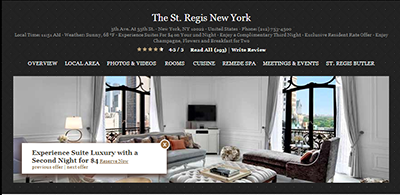J.D. Power has ranked the Ritz-Carlton and JW Marriott as the highest hotels in terms of customer satisfaction amongst luxury brands.
The two hospitality brands have been recognized for being the most loved by customers, more so than any other luxury hotelier. J.D. Power’s "2017 North America Hotel Guest Satisfaction Index Study" also found that loyalty members of hospitality brands are more likely to book directly with the brand instead of an outside party.
"While The Ritz-Carlton and JW Marriott rank highest in the luxury segment, both of these Marriott-affiliated brands appeal to different types of customers," said Rick Garlick, practice lead, travel and hospitality at J.D. Power. "It's important to remember that this study measures guest satisfaction among a hotel brand's own customers and doesn't directly compare hotel brands to one another. Often, the type of guest becomes an important element in determining satisfaction rankings."
Hotel industry
Loyal consumers who are members of a hotel’s rewards program are more likely to book with the brand directly instead of a third party, and consequently experience less booking issues. For instance, 75 percent of members will book with the hotel versus 47 percent of non-members.
J.D. Power's report found that those that do go with a third party such as Expedia or Travelocity are more likely to experience a problem than those that go though the brand directly.

Travel + Leisure app. Image credit: Travel + Leisure
However, bookings through online travel agencies are increasing, with a 3 percent jump from 2013 to 2017. Mobile reservations are also becoming significantly more prevalent with a 12 percent increase in three years.
These guests are more likely to be young consumers or business travelers.
Mobile applications from hotel brands are struggling despite the increase in mobile bookings. Thirty-eight percent of those who have downloaded a hospitality brand’s app do not use it during their stay.
Only 4 percent will use a brand’s app to check in and 1 percent to checkout. But consumers that download a hotel’s app are more likely to be satisfied and are more loyal.
Social media is proving to be a positive tool for hospitality brands with many users posting about a positive experience they had, but 86 percent are likely to post a negative experience online as well.

St. Regis New York reviews
This is extremely important because within the hospitality industry, online ratings and reviews are highly influential to consumers. For instance, 52 percent of guests of a hotel have read a review in the last month and 46 percent wrote a review.
Additional insight
While luxury travel providers may be tempted to add as many bells and whistles to an experience as possible to impress guests, new research shows that by far the most important things for individuals seeking luxury travel are comfort and the ability to just relax.
This data comes from a new survey conducted by Travelzoo and the Global Hotel Alliance, which found that the ability to comfortably sleep on a flight is the number one priority for customers seeking luxury travel accommodations. The findings from the survey suggest that the simplest way to ensure guests have a luxury experience may be the best (see more).
Chatbots for travel brands will soon likely go beyond something that is simply unique and interesting, but will be a necessity that consumers will come to expect.
According to "Are bots worth the bother?", a new report from EyeforTravel, the cost of creating chatbots is lowering, which means it will be more accessible for brands and become more of a standard. Travel is a sector that could be significantly impacted by chatbots in a positive manner, as they can make booking and other tasks much simpler (see more).
"As mobile usage becomes increasingly ubiquitous for guests, the challenge for hotels becomes twofold: First, they must persuade guests to book directly with them, and second, they must encourage easy utilization of this technology," Mr. Garlick said. "By forging direct relationships, hotels can become guardians of the guest experience, but at the center of these relationships is an establishment's mobile strategy."
{"ct":"zFbVW3d1qXyAhSJcKOzTbqvGrNbpOp7IXP8MhD1LcnXZgZbP3jneWXgzrvh08eGVCmWVXoIVVURju1cLhH80XD3FXobFgJl0tPkDYrwq4RsFpszGIT16uVX3pe01fEc6U68EKCrQL76u13+Gi+jcSgHp+ZGAf4z1yn4HYnS8t\/g9ADhhwOQZeUut4ZN5MOCFDzhyZnK5ZXfDWTFzvraaUHgb2dxnFf5Dto5K9X6PM34ers82ldPP4f6Vkx0hhQ+yWfyLQ+wr94nje2HBxWJ8TTWEnKW9x9CpfH+RPAphhIQR3\/y58dclSbL42E92puXrMJD5eICjfgc0wdpHln6AoTUf35t\/+D0R8LNUcyC+2SvRmfK9MzB6CEJstMOptPDnnPFmB1ArbPVBNhG7m\/qPdhA2pJyOcAqP4t1BSQKQCeM3RVh++yAXZE7NUH3db1dGhIEA+\/pIcm5ACaGpymVMz7IhVgzUzYohRxGT\/KrQf\/wgfcRB4mmDY4Rg7K2h5ADMTel4GyKVb5\/EzIlBc85vY1rpo4IqTA7KGa1LmzV0uPLEWM58Hu\/ef0IUmHSH0CZViTgGK9wZnKyyVEi5cpowB+pehW+MULAunFMhTueSu7kmPWNC8n91SwPKukI57FR24D+84BHa\/fnx8103JgvWOVFTqVXqInhZDVZpH6T8o7NWdtu6QMRJOxiQ8U6xBNjvCLqj962hUDGLcHgSLgpLK8bPTKk93NypEOtuodoWMmrOxiCbyLdwFOyHJ0d1TuxtNFtqNM3ABoi697lJC3Z4s5KuQnc2A2pYxStZakOCGlu\/8V0Hz6CqStZgfqPYOnL+mLgwNGapnTgZo5MD2DB2MdwmTxgeScyy9fgrs7QK7efYprcQ3pFboyv1FHLBnVkb1uGGptFk2RrxILeFMSjVSYesQdkgSiV9Rf854iLoBAwAgHH35ujF1q+gaSUskfHioB3iGqQL\/FNaXrEn46n3UEYZmYnQzZBauFRjv0LMkC03IwU4LBPfm0R+\/e+5CpK9Bnz+3sL5kCNpUgL3l\/ayF0j8ny9HRikn3hxWZSK5s5fnsy0JCyskK0kYjwJMOgmjpxE5oXBZXWy8lBhKZ5X79yu30CKG1Al\/Q1LJJS8ELnugFWW+JqKTqFWamtjQe3v6mUosun\/EJ1E3ZeD5OTtsF4KgXUNa1ojUJ+1Sfh9KV5hIpGiFGbiim\/R99Ds5nsfUpS2oZLDHiLxgy\/IlcAVqkA3pKoxUp+VpcXKw74Otan\/f9HT88vDhol3G65kYFLZnyHX1WQ0bJ6cPR7R+he1\/c\/4ncygJp8pMnzPW9wDz\/zSRVOwtdyh8mslxd5gllQUO\/GU\/hmq3XC5vUisObFmTJjqkPiwz7+8\/bNX534OqYRJgYcOJsxFcD2ir2EQx4O\/c2L2iXfpP0kS2dOmb4pDxVaz7Ud3yEQKSsdoZFDfL3WTZv52ujiLAN1Fmia9qjf790nk7n1ouB6Odrv9lyyXTPopAk11eOvFXHC4bzldKdon4PDrFZVdIm\/\/BJUXc+1hG69ktOEIsb3f70K0RCX07Bbzn3P3xd1YHfto5H+tXgzyOBzF1tn4T3SUP0SPtWZvKR8yWvIDKatTpM22p2U4LBdk0TowG1iTiYV3GO9roXZ4Gvi7rC9lj8ZFmHYus1EBemDM5d3zp9ovHs+CVTp79fMW8WCdK4x0kRBRMKKe3u7sEAtytKIQWAoIm\/FhAZzmvwXcVucSRPQxY1OfIJ65Rp7qAdmi1ZVAolj9F5ItAStMJWypx8+956wq3c+ZWgwc5ZlmU\/6RZMyWoHbgA\/OrXiqIr5LTnzex4nOl9FzDdI6VQcATtHTHCajnKDFFFTPzLU\/SA0L+IqweCnGUuRYxJ390qZYeYH9j3tFY4NK12hWEO0VNUyhFKa4u8ux5VCc8EbBpOchUfzROivLpNjc8ywYNqDqbybnXPqKwXle+zprUd\/6YZ9E1OVQrTzhTaNMuHsqMp42IxCr9Ob23LvBcNxNGgP4aDkj05TllfNrLjQyrparTTP7paQZvO\/fDTorRMA+oITsMXMQGS7NYPKblbfm5iMjdBtIEfdLmWaszegkfhyQqFvrjXhPB9DiJQs6SsKBflBpp9+z+xm4ds7Q2RsPnRlsHK9a3D7YI4T6+zsjyUokg5wLAWPj54N9yGVoSZa4riWBqdea0J2V7oIYBPnLO7RQ5HfZDDcTa7SLMLC2u9hnl\/en7Ys0zNQp2EiYJXGdpMdPFaCUn9GhwrmJZ1bjJAl\/ywP6PL0I97sSyNYgL3\/i6eWiRmpy4rUcTpEd7HbxRUMg75a2bEvKLkByLpUIFIptUr5XTVCkc6MRtjX0lEgtbwJIDwYmXm5s6lyKPiFXdGFOzRftzfWkwZbOjqOY+J61WHh+DH3mDkKSS6o2vJ93EQfufeeKG7UHxDYPKsq22edubXibFy4G6PS5f29cbpQVJVZoLIEfQ80lR6u147SaXouow3Fvo1yDSz6xKvYnto2Zx8Pa3Zd+Bqqv4lEYV6QrrdA8LaMRXWRI8MlIXogNiYqEkPbY2\/BJCmIJ9psqxR0uNYsYYMwyOnf3hQqoMe8PvelyJEtfyIdTkHHjtmPuLn2WftinWcjA0MvY9CXlx+J+Q9sZnpF8oHRwD21d0DgR9CCy7uQoosVhlGwbx24ftIK1Ia\/LUIFK214zDXn1v2FWm2NfAhkG5f+H1WD69bRDBi0+OLNrKWU\/6+CzqzBQZumzYMz\/Ldaw2IzfXgqLc2tTC1pMT0\/9W0QcRQQHrG8uJxUNsiBFjF6678BD0r2NYY3Kp\/EAQUAYR4kshoaXpVF\/D7blM\/1bOJ1i8bFdJFHaA\/iT5COJFVpayBaYwl1T8MBoCAfaihslT2UnPzAM4gBlAbthU9UYILQgEXmujXCI2s0dL275mxTmWFYdEvbeaK5nCFf5jIHnXvtvI0Mz0q\/p0PVzdttLkf4JDyIcohlJg8gkW0BQYMGRg3mo4wp5aIPFJ4OicYPtZzWppivq9t4YJ\/yeby1A+S26bMAe+SXr\/ZDfKMUcgS+7jQLiVzdpTjdamEpV4qPukhpk805rrmWCDoxjQdrF7eOUIKRhm9GTRsryy58sBTRjBdfxadImbiZpB3JQa+8w0plG5Z33rNgTMtObQQSsnjegsyD5UuJ5ezVB4CAy7xAuGLXw2LDX5RQSZayi1uZyg4HxFWYZcFehfQoqUJ0qb1Pxe6pjJMwskB+S43h2cFkO4+KWme+wl68SbH3zIboyULlkZNg\/J+cA1KtXMBARQWj\/y0R\/gijeLsn6d8ywhhzLVvsfGfFannu4bjtJszBWrsDnFSB0hrSVvaYUi90oumIPn7laXgb7GPYjEJVrc7m1+A9gHa5MnQTbiWNExQdX0Q5+5dvJnoyXL93FQM2FiCMREDxgKEczJBgXZSpeY3+F5FfyIoUgTaaTCK24XjGthELTeDGtOmHb5\/W07oLWRFtKV00EeplFHjiFK9CrJMCz0lBor7V9DrE3ZlqscoDzQq9WeWCIMNcFziLNoY0AK9eiNNLvR7CLtiGF2o4QfDeOzGQDo5R9SpsZu0VSYOCFsYOOZNp7SVqi9r5mpsg30i2uPt6Ao9kFXQUvvdaCrv\/UilWHVgCFQENJOMEI0h2NrELqc+mi2UBOqvwEiTRCvmWK4BrWY4U9epI0kyuSDfQwLf2mj8F6d6q\/UTZSQ9sSM2pAali5etg6JOhQRlQcOGzkAIVCugAKJpM33JHrxEVhU35VCwkPE4qdjrjSHjv4erILvBol0hgbn3+Xsefhkyd\/nDhsfIrJcGwgJei9w7+EfbdRLcxejtqaY5NFF\/nX0wYyZZKn9DoeQlUUTsYtPKdVRDLZ+g6t\/GH2kDkBmlqt\/APYzrJCPLwHkxzbtXYmWXAsmM4FZ9rkMtsgH1SCrnl2pWiSrV71xGB7YpfFbhgcwIWnlM10TgCcH7qf+i5S1QETNe3B1k5Ta9D8qf5AF62GKvukGYjwbqoaeGgwEYyMHdereDYaxCWp7a74XAk1cmgqGAdtHpHMDLedAlUx7420V7hXToJIOStdsMyyhhHngMTW0mK0p2og0c35uC22FMJ6XNQutFkGaUuOMvZmNAoPtNH9t10azFYCnvSzgX9ClxFcgeOfg4nqXUZurK1WVGZkdpr5DQKeGCDCB+xDvmIelytMHJVbmdOTax\/3XdW7AIe5B8n1nEizF96Os875JTE\/HuL4zZBAnbD+ZAmdkPNGqTlHUCvP8\/w91BqjpNzT6ueFJcR363DoVt40+kU021IrZYnbX4xHxZv5X6zJdypjrp9k56vfIMdJUOLnMNV1EIMrsYg2g2GXGJ3Mntr7WLfSoLEgHkXn6nr91JhfjIk4Vc7Bg0GN40Ls\/zJVCXB9rFYm80whMuCNvpOUOOvxuJNGB0YVBTVnwkodwgnaGK5JOhDls57mNK\/OUdv3wgumrhWYiU84tFXvVdpnsq7ssfpwRV3TtZIXbzwf1qtBPJQtjDFjkxtJZ9wpTppJld4KZP2ZihBX7DJBX53bhhFy2SJHJW2AeYndpAtDkQz4XkZmR7ukI71oFLgQOSm\/sBRAf7A0ZT3IP\/MOuPkRVw5xzGxZeVIq\/GkK0C811scuXpz9IKPpjUapKGdVChYRfHtQ+9GKzywwp2b4UcjswivyI9yz+HD1Ri9DYQhILhph9Qdd+pV4JB8Rgor\/QmbSaatRtk5LmJGzJsMfM5Xd+wtfwzxXZHGTYWsDvbk+isf8z3aSWSGEbFyRoFRfsLAMLSppSHozaVF254V5miecF3R3c734s8Bc9YbcwS4ILSL7rz\/pOtgkS0vKuUXRueKTDWuqe4su\/EkMQoJE54tz1XarHe0+h+NFTr9T+LkJJQQQRm+IDpQmg7sAvoukFlQsRqIbowuRfg+i0DGl8FaX4YAzllgIWKaXnQGz00VLNem5pbVwxN5bLqKgaK7HSszoRtDfLoLthg8H5+iktSNmQj5F3fCNNPAXhW3mAygeEzFc0HYi4z4BV+NzvycAawdGBfyIONeO7t5K0mFkd49Bo+heEMypXpcGu91yUcq3MXZ\/XjPCRGcuPleprVdcH0aLmcKGAF1TQt+25ICD6rkGC7TE54G8EYzCvShCdwHfHEZ52+03ZZrb4IDtki3tRp4p7c6taUhCR8\/7Ansz5virc7vODjjk3vuFsDZ9JJ4PPnvO3ZeB5j+lcYaM3EiUiTIeVyIA5+GxOxmXNFvJTGeTZ1d1+ekQe4ssoj58\/fk13ZQX7raqveR4kX8R8XuH2Yq8+2XbN5rONshll1TdYb1L+hptTXj9juNsijE6LuVo8jwEVAjjTyri84+incK7J2WUbWrUx7CpAJeS7OnGmUjruCz1mZXWZAx2VoPwUat13Byup4qT22AMo3Zk8jmVPXLdfGeJEu0lov2+8YvsqyviTewdfRio8mWnvTFndJwe9KThLv4UhJcSXwVqm5pWI4eDg0WKFE2TXBEz7PoGXSKg4uJIdRBlnfY4u3PtCkQ0FEd4L89RKQccqGQRxk7HbAOWP5iJNtPchRa7TGQair1Xle1Gj\/jy91OoN6e1Hb85i++8b0VnogvV\/aJJyUfjiRO8YGTP+tmu\/29arjqYRfEH49M86TGqYEZALKSdFgobM4M5yQldnUSdh95z57UuY7pT71FKCnCqGDge9BQPOCq+fpafdxHvtKcPg4nn0jDWgS58XHSLMRAlgX7+Qn\/T8zEFa4Z4wEopBUbWQROlWkFkWUwJ8y4TAu1NrFAhg23yXoqH6dR21cpr7FRH8MdGY+lHKb\/ZpLKX9wN7Lh3ekSxaP19uRiw\/Myv1W20ieCaexZz0qLX7rNnY2xEcqZ2h3Jw77mmXsn+FfQDXR+\/g\/IA2o3ta0I3gTW173xv60A03FeliICLlmbRYPRrTQQ8sRlt3+tguzYOv6dsJAs7XsNPoP9XV\/8yYobE66XmYOks7BjC06uyyUHiv3yeK3n\/zAHnr1VhkPj7eX0oMkgzygh53k5KvuACcR48Kl07WuWQA1YpLh82z0VEDZslRvPJtEyhiZbGwVEdSlianBZXBVK6+Jz3yS80XjE1TEMlOshSNj\/I7cgzVNHrf5p2utn46JOSyKdXzw1oat+nULUdSdxiiPsioU6tl1iXwGlzI5F59NP7nFGwMTu01naEu9xxhnMYMCNqYKsaFmvC+T4LP5Th9hdFm7QU6BITQfLxBE879r\/BhNNk7fpV0RGtllrpCWeb+1co\/RflzhKB9VK3J1lWmFjDipMI0+idJYmrI0qYffYlnwfW5x+ofXcOrIBHEeV6ODrZzXQ1y2EZe\/3UeplGxdylFDvsWrANP7iw5YNTMa+jft8N3e7HVO7VWJ9qpGM3OqjmPJBv5pWM3rY2RrYPWvbpAX8ieOj6HmIuhhf6K1yziU9Fp9nDO1gWP4oqUioFeGG3qdfFjI\/X24CspYJuWuryHE6TTeLuaaWxB15IZbDwAU2VOcbmIi\/9BAZ7BkbMzVxhZuh\/Dnv+BxXkM8cNRTOviS\/WujJ1DdM8f2jZZxOiurcLkemRUwxgJtYU9hiL3vqpuPx2NdvW07k5Ru7GBhMt2Su48AD49ropyxZ+Dmk0MbWSx99GRb9OJzgODu46taKDgx3Fza+WJvot0dcRNStLpw\/EOX2dVzh8MenoO76caxWtb0qYhdGVN49E+8\/fVXuqKfXrNfQC2O+e2ldgS5Y66ht4hX0S58XV2vDAxm0K13mDSDwTp7oD2NPs5Yr+mZcwMR7OzP8mpX88IFmdHv1qfLubsJwEo7xxj4mBsfDjOP8wx\/TFElaVC6Okwv9yZnkZ1OO\/9P5XRW+Pw3SuSvD5UFywFuktZUk2jaHJ7AWWrh30\/II7Ijr+HWy\/1hQMYuogIOW1ECbu6iO32LwffbqTlB+eBU2X78BTbAb\/C+8SNENTjSEATjFs4q\/bGMpQy6HwwgxCxpkxQjMGbMX7\/Vf92QseAmlH3dokmdgTHUyEv94ROoVYZfsKdD6FLQx885nEqJG9qN5yKVal8F137O0xGW5+grirR+VNaDdD+8rr\/yflHnpDozjLlDkVv8HRk4\/E9dvja7TrUvHqHWL0dmDky4f2NFh+ops7UL0A6E1gFPvkgsJrqtVWc\/9WBgYVDO\/lSy6y5XvNxCp8Hzbs6KO\/tSPTos3geKiVmqMjmejhDUtxm\/vw2VDk945omtASDtql02Gu6HLxwSvHIdbVjE41t+msT7a0eehGQdQuWEmiNnN+x\/Ieg==","iv":"149fbfca02c147ae4c7e47021648f145","s":"37793a0edb4e8a50"}

 Inside the Ritz-Carlton, Astana. Image courtesy of The Ritz-Carlton
Inside the Ritz-Carlton, Astana. Image courtesy of The Ritz-Carlton